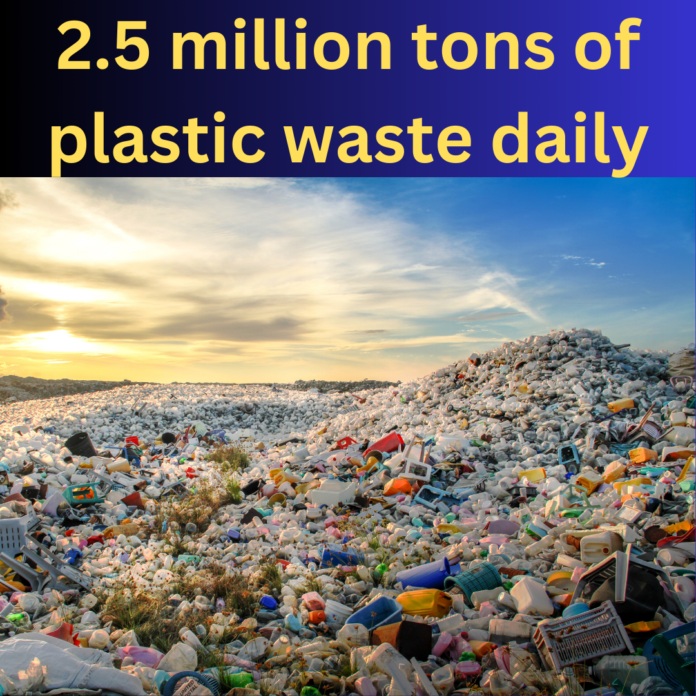In recent decades, plastic has become an indispensable material due to its versatility, durability, and cost-effectiveness. However, the environmental impact of plastic waste has become a significant concern. According to the most recent estimates, the world produces approximately 2.5 million tons of plastic waste daily. This staggering figure underscores a pressing need to address plastic pollution through comprehensive strategies and concerted global efforts.
Understanding Plastic Waste Production
Plastic waste generation is a byproduct of the widespread use of plastic products in various sectors, including packaging, construction, automotive, and consumer goods. The convenience of plastic has led to its pervasive use in single-use items like packaging, bottles, and bags. For instance, plastic packaging alone constitutes a significant portion of the daily plastic waste, with millions of tons ending up in landfills or the environment every day.
The longevity of plastic materials exacerbates the problem. Plastics can take hundreds to thousands of years to decompose, during which they break down into smaller microplastics. These microplastics infiltrate ecosystems, affecting wildlife and potentially entering the food chain, thereby posing health risks to humans and animals alike.
Strategies for Reducing Plastic Waste
- Enhancing Recycling Efforts One of the most effective ways to reduce plastic waste is to improve recycling processes. Although recycling rates for plastics have been increasing, they remain relatively low compared to other materials. Expanding recycling infrastructure, increasing public awareness, and developing advanced recycling technologies can help. For instance, chemical recycling, which breaks down plastics into their original monomers, holds promise for creating a circular economy where plastics are reused rather than discarded.
- Promoting Alternatives to Plastic Reducing reliance on single-use plastics is crucial. Governments, businesses, and consumers can advocate for and adopt alternative materials such as biodegradable options, glass, or metal. Innovations in packaging, such as compostable films made from plant-based materials, are gaining traction. Encouraging the use of reusable products, such as cloth bags, stainless steel bottles, and refillable containers, can significantly cut down plastic waste.
- Implementing Policy Measures Policy interventions play a vital role in curbing plastic waste. Governments around the world are introducing regulations to limit plastic use, such as bans on single-use plastic bags or restrictions on plastic straws. Extended producer responsibility (EPR) programs require manufacturers to manage the lifecycle of their products, including their disposal. By implementing and enforcing these policies, governments can drive significant reductions in plastic waste.
- Encouraging Corporate Responsibility Businesses have a critical role in reducing plastic waste. Companies can commit to sustainable practices by redesigning products and packaging to minimize plastic use. Many corporations are already setting ambitious targets for reducing plastic waste and increasing the use of recycled materials. Consumer pressure and shareholder advocacy can drive businesses to adopt more sustainable practices, contributing to a broader reduction in plastic waste.
- Raising Public Awareness Educating the public about the environmental impact of plastic waste is essential for fostering behavioral change. Campaigns that highlight the detrimental effects of plastic pollution and promote sustainable practices can empower individuals to make informed choices. Schools, media, and community organizations can play pivotal roles in spreading awareness and encouraging environmentally friendly behaviors.
- Supporting Innovation and Research Investment in research and development is crucial for discovering new solutions to plastic waste. Innovations such as advanced waste management technologies, alternative materials, and improved recycling methods can offer long-term solutions to the plastic crisis. Supporting research initiatives and fostering collaboration between scientists, industry leaders, and policymakers can drive progress in managing plastic waste more effectively.
Conclusion
The daily global production of approximately 2.5 million tons of plastic waste poses a severe environmental challenge. Addressing this issue requires a multifaceted approach, involving enhanced recycling efforts, adoption of alternatives to plastic, supportive policies, corporate responsibility, public education, and research innovation. By implementing these strategies, individuals, businesses, and governments can work together to mitigate the impact of plastic waste, ultimately fostering a healthier planet for future generations.








